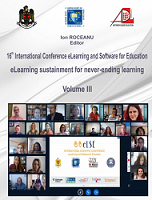INTRODUCTION TO SMART EDUCATION
INTRODUCTION TO SMART EDUCATION
Author(s): Ioan VlașinSubject(s): Psychology, State/Government and Education, ICT Information and Communications Technologies, Sociology of Education, Distance learning / e-learning, Pedagogy
Published by: Carol I National Defence University Publishing House
Keywords: smart education; smart systems theory; individualization; transcultural perspective;
Summary/Abstract: New technology-inspired terms such as Smart City, Smart Education or Smart Society are being circulated lately. The usual approach to achieving them is aimed only at introducing smart technology, not a comprehensive analysis based on systems’ theory, to which specific elements allow them to be intelligent, autonomous and self-programmable. A short analysis of what the term smart means, how it can be applied to humans and how education should be, if we consider these things, is a brief review of the work. From the analysis carried out here it results another approach, much more natural and truly effective called Smart Education. Classical education does not take into account the fact that man is an intelligent, self-programmable, autonomous and integrable system, which is why it does not report realistically and respectfully to the pupil, its intervention is brutal, even traumatizing. At the age of individualization, it ignores the real, profound needs of man and works only as a cultural programming tool. It does not really develop competence as a quality participation, but only certain skills etc. It does not consider the real integration of the person itself and in overpower systems because it does not explicitly pursue the development of character and preservation of integrity, the basic elements to be trustworthy. Smart education does not imply the introduction of modern technology in education, but its superior recovery as an environment, according to M. McLuhan's approaches that allows for a retrieval and self-development of man as a smart system. It is built from a new, transcultural perspective based on systems’ theory, complemented by the analysis of how smart systems work and taking into account the three types of human programming. In full accord with the nature of man, looking at the most general possible perspective, it supports its individualization and integration, giving the human (organizations, communities, etc.) the possibility of deployment from cultures and their higher recovery. In order for education to be truly a smart one, the approach and tools used within it must lead to the conscious construction and management of all components of an intelligent system, adapted and capable of supporting any entity that wants to learn, from one person to a nation. Thus, education can be greatly improved and supported entities can become self-aware and act more intelligently than using classical education.
Journal: Conference proceedings of »eLearning and Software for Education« (eLSE)
- Issue Year: 16/2020
- Issue No: 03
- Page Range: 156-163
- Page Count: 8
- Language: English

